Expanding support to Water Accounting in River Basins and Water Productivity Measurements in Irrigation Projects (ADB phase 2 (2019 - 2020))
Background
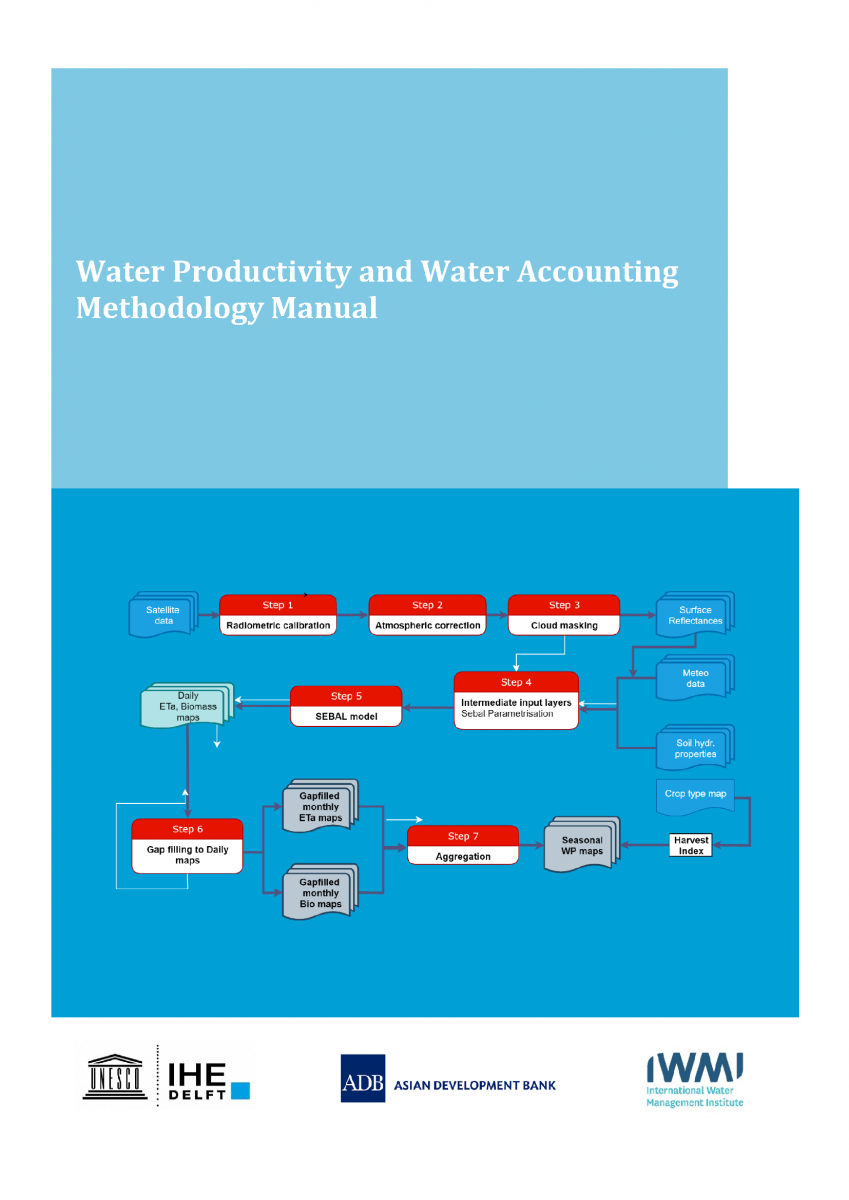 The ADB is committed under its Water Operational Plan 2011-2020 to undertake expanded and enhanced analytical work to enable its developing member countries to secure deeper and sharper understanding of water issues and solutions. IHE Delft, in partnership with IWMI, therefore implemented various studies under the assignment “Expanding support to Water Accounting in River Basins and Water Productivity Measurements in Irrigated projects” (42384-012). The studies aim to support (a) ADB’s lending and non-lending assistance in the water sector, and (b) the design of irrigation projects at an early stage at selected candidate projects. IHE Delft and IWMI created comprehensive, comprehensible and accessible information on available water resources and their current uses in major river basins. The focus for the irrigation projects is on providing baseline data for parameters related to land and water productivity and identifying suitable interventions (i.e. through water productivity analyses). The main focus is on making the best use of remote sensing data and information to inform decision making. The analyses contributed to various ADB funded projects in six countries (Cambodia, India, Kazakhstan, Mongolia, Philippines and Sri Lanka). The focus of the analyses was on using remote sensing information to assess the water resources situation at basin level (Water Accounting – WA+) and to assess the spatial (and temporal) variability of land and water productivity in irrigation schemes (Water Productivity - WP). The methodology applied is detailed in the methodology report.
The ADB is committed under its Water Operational Plan 2011-2020 to undertake expanded and enhanced analytical work to enable its developing member countries to secure deeper and sharper understanding of water issues and solutions. IHE Delft, in partnership with IWMI, therefore implemented various studies under the assignment “Expanding support to Water Accounting in River Basins and Water Productivity Measurements in Irrigated projects” (42384-012). The studies aim to support (a) ADB’s lending and non-lending assistance in the water sector, and (b) the design of irrigation projects at an early stage at selected candidate projects. IHE Delft and IWMI created comprehensive, comprehensible and accessible information on available water resources and their current uses in major river basins. The focus for the irrigation projects is on providing baseline data for parameters related to land and water productivity and identifying suitable interventions (i.e. through water productivity analyses). The main focus is on making the best use of remote sensing data and information to inform decision making. The analyses contributed to various ADB funded projects in six countries (Cambodia, India, Kazakhstan, Mongolia, Philippines and Sri Lanka). The focus of the analyses was on using remote sensing information to assess the water resources situation at basin level (Water Accounting – WA+) and to assess the spatial (and temporal) variability of land and water productivity in irrigation schemes (Water Productivity - WP). The methodology applied is detailed in the methodology report.
Case studies
Water Accounting
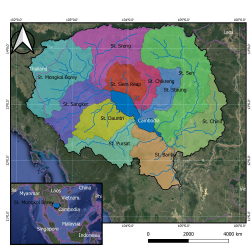
The water accounting study in Cambodia supports the Irrigated Agriculture Improvement Project (CAM 51159-002). It focuses on one of the irrigation schemes listed in the project, the Kamping Pouy irrigation scheme, located in one of the tributaries of the Tonle Sap river basin. In addition to assessing the water availability for the scheme, the study provides an inter-basin comparison between the different tributaries of Tonle Sap. A Relative Water Deficit parameter (RWD) was produced as a proxy to inform where problems may exist with water delivery across the command areas. Read the report here
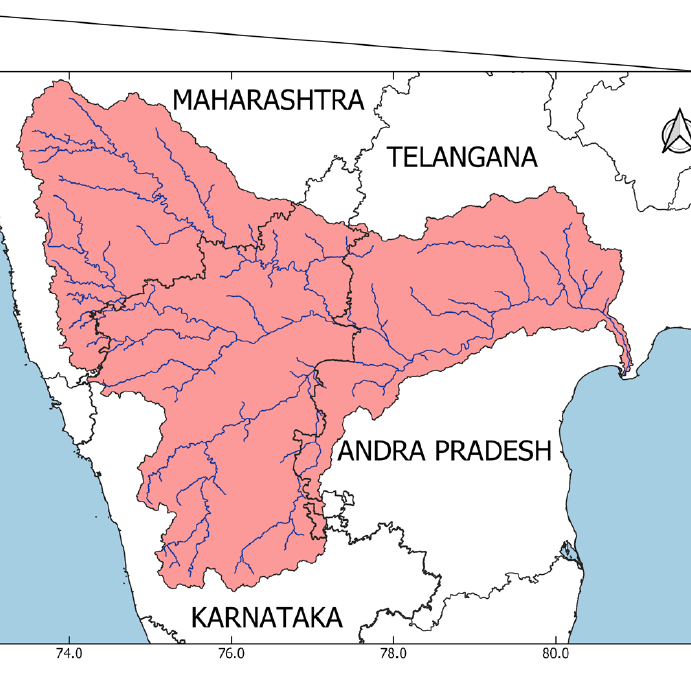
The study was implemented in close collaboration with the Advanced Center for Integrated Water Resources Management (ACIWRM) to support the Karnataka Integrated and Sustainable Water Resources Management Investment Program - Tranche 2 (IND 43253-026). The Krishna basin is the fifth largest river basin in India shared between four states: Karnataka (44%), Maharashtra (26.7%), Telangana (20%), and Andra Pradesh (9.3%). Water accounts were developed to analyse the water resources conditions of three sub-basins of Krishna located in Karnataka state: Middle Krishna (K2), Ghatprabha (K3), and Malprabha (K4). Read the report here
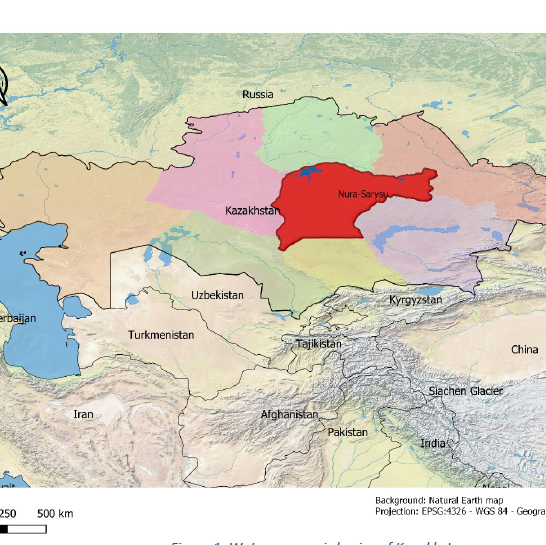
The water accounting study for Kazakhstan supports the Irrigation rehabilitation project (KAZ 50387-001) and focusses on the Nura-Sarysu river basin. The Nura-Sarysu WEB is an internal drainage basin, entirely located within the country borders of Kazakhstan covering an area of 139,700 km2. As the majority of the agriculture takes place with in the Nura river basin, which drains to Lake Tengiz, the focus of the water accounting analyses was on the drainage catchment of Lake Tengiz. Read the report here
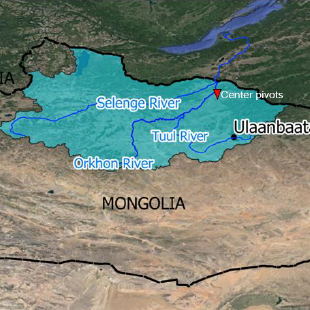
The Water Accounting study in Mongolia focussed on the Selenge river basin and one of the su b-basins (Sugnugur) where ADB intends to support the rehabilitation of an irrigation system. The analyses contributed to the Vegetable production and irrigated agriculture project (MON 51423-002) and the Implementing Innovative Approaches for Improved Water Governance project (MON 51099-001). In addition, a field-scale WP study was done for the 2 center pivots of the Plant Science and Agricultural Training and Research Institute, one of the beneficiaries of the study. Read the report here
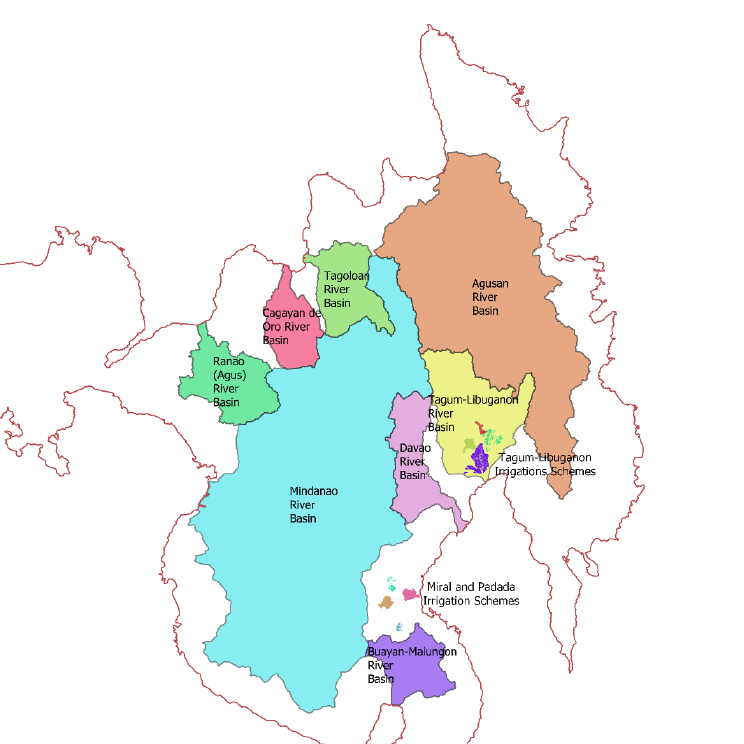
The study was implemented in close collaboration with the Advanced Center for Integrated W ater Resources Management (ACIWRM) to support the Karnataka Integrated and Sustainable Water Resources Management Investment Program - Tranche 2 (IND 43253-026). The Krishna basin is the fifth largest river basin in India shared between four states: Karnataka (44%), Maharashtra (26.7%), Telangana (20%), and Andra Pradesh (9.3%). Water accounts were developed to analyse the water resources conditions of three sub-basins of Krishna located in Karnataka state: Middle Krishna (K2), Ghatprabha (K3), and Malprabha (K4). Read the report here
Water Productivity
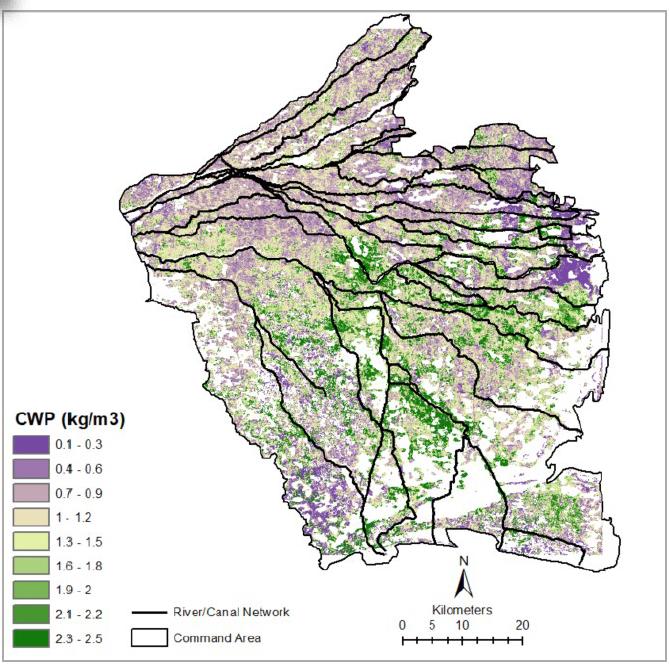
The WP analyses in Tamil Nadu supported the Climate Adaptation in Vennar Subbasin in Cauvery Delta Project (CAVSCDP; Loan-3394-IND). It focuses on the Vennar command areas (also referred to in the CAVSCDP as the “Vennar subbasin”), which covers an area of 4,154 km2. A Relative Water Deficit parameter (RWD) was produced as a proxy to inform where problems may exist with water delivery across the command areas. Read the report here
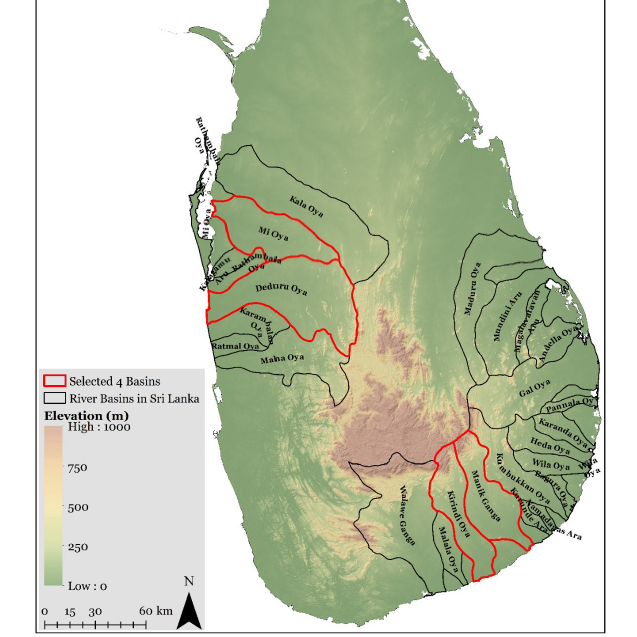
The WP study in Sri Lanka supports the Integrated Water Productivity Improvement Project (SRI 52156-001) (IWPIP). The remote sensing analysis was conducted for 25 basins located in North Western, Uva, and Southern Provinces; four priority river basins have been selected: (i) Deduru Oya and Mi Oya in the North Western Province, and (ii) Kirindi Oya and Menik Ganga which straddle the Uva and Southern Province. The study focuses on an assessment of crop phenology, as well as for the 4 priority basins, focusing on a water productivity assessment. Read the report here
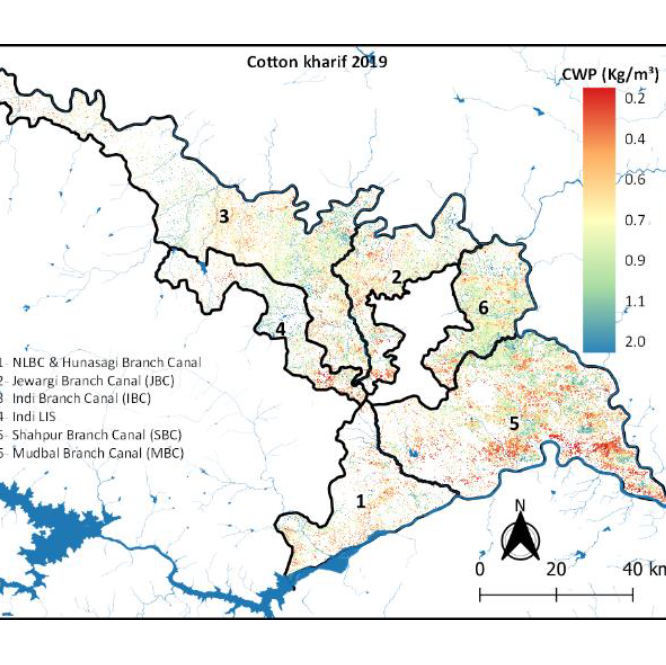
India Naranyanpur Left Bank Canal, Karnataka
The WP study was implemented in close collaboration with the Advanced Center for Integrated Water Resources Management (ACIWRM) to support the Karnataka Integrated and Sustainable Water Resources Management Investment Program - Tranche 2 (IND 43253-026). The WP studies are carried out in the Narayanpur Left Bank Canal (NLBC) command area under Upper Krishna Project (UKP) in Northern Karnataka state in India. This study focuses on the NLBC network which comprises an irrigated area of 451,703 ha. The NLBC is divided into six culturable command areas (CCAs) that are supported by the branch canals. Read the report here
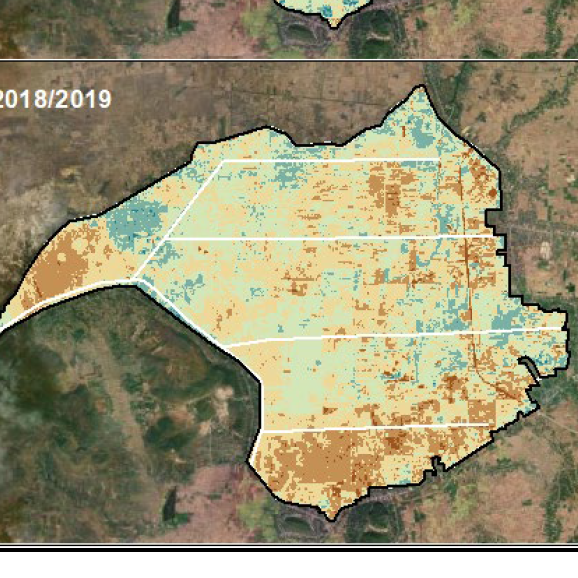
The WP analyses conducted in Cambodia are intended to support the Irrigated Agriculture Improvement Project; this Project will assist the Government of Cambodia to modernize and improve the climate and disaster resilience of four irrigation systems in Battambang, Kampong Cham, Kampong Thom, and Takeo provinces to supply water to 43,500 hectares. The area selected for the water productivity study is the Kamping Pouy Irrigation System (KPIS) in Battambang Province. The KPIS system serves 19,000 ha, from which 12,000 ha is the command area of the subproject. The activity focused on the generation of actual evapotranspiration from remote sensing data for the scheme, the analysis of water deficits calculated from this, and the estimation of above ground biomass production across the irrigation scheme. Read the report here
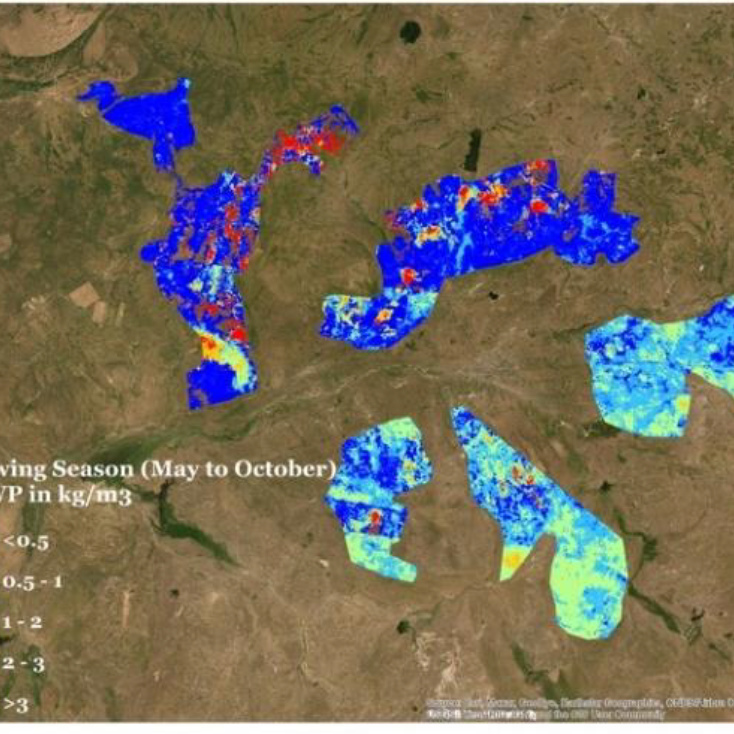
The activities undertaken for Kazakhstan focused in the Karaghandy region, and were intended to support the proposed Irrigation Rehabilitation Sector Project which is being prepared as part of Kazakhstan Government’s “State Program on Development of Agricultural Industry for 2017-2021”. In the Karaghandy region the Project will finance rehabilitation of 6 canals and 23 pipelines in 10 schemes of 6 districts, namely Abai, Zhezkazgan, Zhanaarka, Bukhar-Zhyrau, Osakarovka and Nura districts. Read the report here
